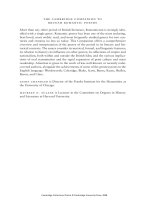The cambridge companion to british roman 55
Bạn đang xem bản rút gọn của tài liệu. Xem và tải ngay bản đầy đủ của tài liệu tại đây (39.58 KB, 1 trang )
The living pantheon of poets in 1820
21 Byron, Don Juan, in The Complete Poetic Works, ed. Jerome J. McGann, 7 vols.
(Oxford: Clarendon Press, 1980–93), vol. v.
22 Wordsworth, letter to Henry Crabbe Robinson, late January 1820, in The Letters
of William and Dorothy Wordsworth: The Middle Years, ed. Ernest de Selincourt,
2 vols. (Oxford: Clarendon Press, 1937), vol. ii, p. 579.
23 See The Sceptic: A Hemans–Byron Dialogue, ed. Nanora Sweet and Barbara
Taylor: www.rc.umd.edu/editions/sceptic.
24 Byron, Byron’s Letters and Journals, ed. Leslie A. Marchand, 11 vols. (London:
John Murray, 1973–9), vol. vii, pp. 113–14.
25 Mill, Autobiography of John Stuart Mill (London: Longmans, Green, Reader, &
Dyer, 1873), ch. 5.
26 Hazlitt, The Spirit of the Age, in The Complete Works of William Hazlitt, ed.
P. P. Howe, 21 vols. (London: J. M. Dent, 1930–4), vol. xi, p. 191.
27 See, e.g., Nicholas Roe on “To Autumn,” in John Keats and the Poetry of Dissent
(Oxford: Clarendon Press, 1997), pp. 253–65.
28 See Ann Rowland, “Romantic poetry and the novel,” in this volume.
29 On Keats’s striking language see Christopher Ricks, Keats and Embarrassment
(Oxford: Clarendon Press, 1974); William Keach, “Cockney Couplets: Keats and
the Politics of Style,” Studies in Romanticism 25 (Summer 1986), pp. 182–96;
Marjorie Levinson, Keats’s Life of Allegory: The Origins of a Style (Oxford: Basil
Blackwell, 1988); and Jerome J. McGann, The Beauty of Inflections: Literary
Investigations in Historical Method and Theory (Oxford: Clarendon Press, 1988),
pp. 17–65.
30 See Jeffrey N. Cox, Poetry and Politics in the Cockney School: Keats, Shelley, Hunt
and Their Circle (Cambridge: Cambridge University Press, 1998), pp. 146–86.
31 Wordsworth, Lyrical Ballads and Other Poems, 1797–1800, ed. James Butler and
Karen Green (Ithaca: Cornell University Press, 1992), p. 747.
32 On Wordsworth’s statement, see Rowland, “Romantic poetry and the novel,”
below, pp. 120–1; and Gamer, Romanticism and the Gothic, pp. 90–126. While it
is true that Wordsworth attacks “frantic,” “sickly,” “stupid,” “idle,” and “extravagant” versions of these genres rather than necessarily the genres themselves, this
passage has often been read as a defense of the lyric against narrative and dramatic
forms in ways that would shape various constructions of Romanticism.
33 Stuart Curran, Poetic Form and British Romanticism (Oxford: Oxford University
Press, 1986), p. 150.
34 Cox, Poetry and Politics in the Cockney School, pp. 164–5.
35 McGann, The Beauty of Inflections, p. 53.
FURTHER READING
Fraistat, Neil, The Poem and the Book: Interpreting Collections of Romantic Poetry
(Chapel Hill: University of North Carolina Press, 1985)
Mandell, Laura, and Michael Gamer, “The Canon and the Net,” Special issue of
Romanticism on the Net 10 (May 1998)
McGann, Jerome, The Poetics of Sensibility: A Revolution in Literary Style (Oxford:
Clarendon Press, 1996)
Mellor, Anne, Romanticism and Gender (New York: Routledge, 1993)
33
Cambridge Collections Online © Cambridge University Press, 2008









